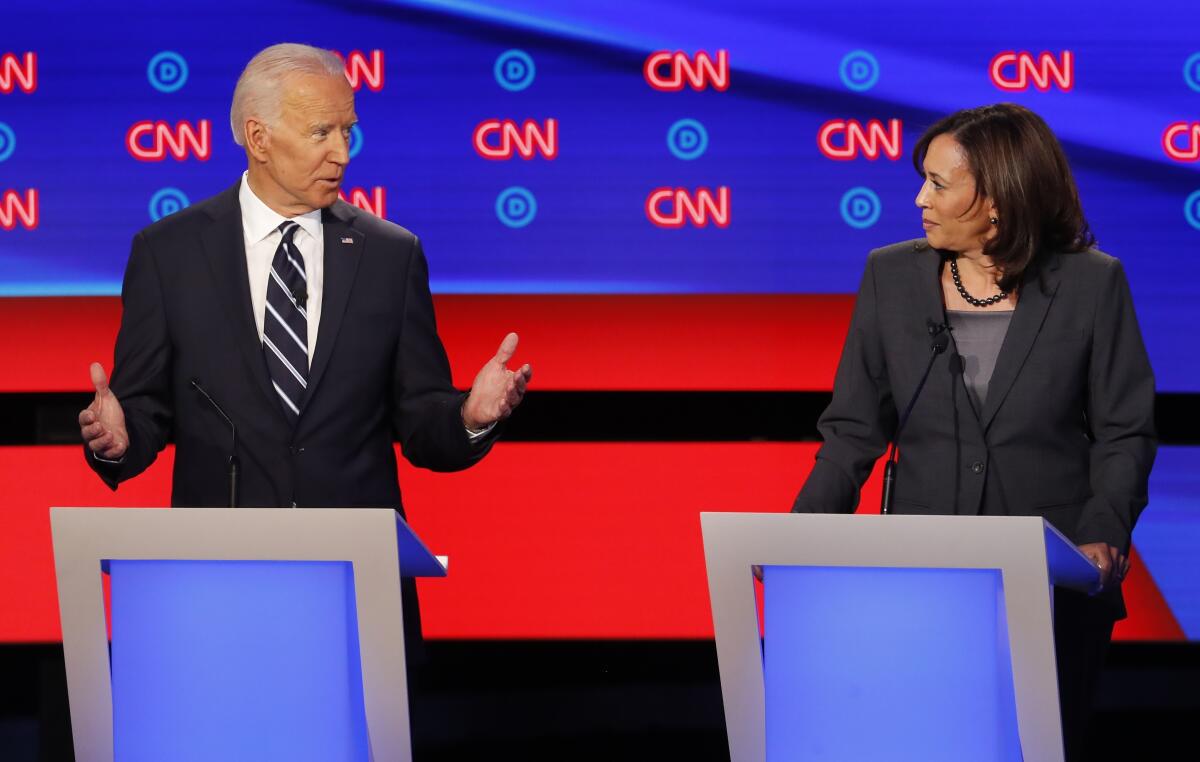Kamala Harris’ prospects improve as Joe Biden searches for a running mate

WASHINGTON — The “progressive prosecutor” brand Kamala Harris tried to build during her failed 2020 presidential bid never stuck with many party activists, who argued her record made her more deserving of the viral meme “Kamala is a cop.”
Yet, with the country gripped by a wave of protest against police brutality toward people of color — and former Vice President Joe Biden searching for a running mate — California’s junior senator is working overtime to cement the progressive-prosecutor label into the minds of voters.
This time, the effort appears to be working better.
Since the killing of George Floyd in Minneapolis last week, the race to join Biden on the ticket has shifted abruptly in Harris’ favor, according to Democratic strategists and analysts.
Although the campaign dynamics could easily change again by late July, when Biden says he’ll make his pick, Harris is making the most of the moment, showing up everywhere and anywhere she can to position herself as a healer, a crusader and a shrewd political mind capable of shepherding change through the criminal justice system.
“There hasn’t been a stronger voice on this issue and out in front and more in the street with marchers than Sen. Harris,” said Cornell Belcher, who was a pollster for Barack Obama and has been critical of his party’s lackluster outreach to black voters in recent years.
“If there is one person who has connected in this moment in a way that rises above some of the others, it is Kamala Harris.”
Even some activists who pummeled Harris during the primary campaign have toned down their criticism, seeing her as the best opportunity for a woman of color to emerge as Biden’s running mate.
But it remains to be seen whether Harris, a politician who has long excelled at creating inspirational moments only to falter in the follow-through, can move beyond the missteps of her past and persuade voters that she can deliver.
“America is raw right now,” Harris said at a news conference with other lawmakers Tuesday, one of her many public appearances since America’s cities erupted in protest. “Her wounds are exposed. The reality of it is that the life of a black person in America historically, and even most recently with Mr. Floyd, has never been treated as fully human.”
Harris, who declined an interview request, said at that event that she chose a career as a prosecutor because “I knew how law enforcement had a long history of enforcing laws indiscriminately, and often based on race, and racism.”
She demanded Congress “take action to reform a criminal justice system that for far too long has been informed by systemic racism and by racial bias.”
The typically opaque race for the vice presidential nomination has become an open audition in the current campaign cycle.
Get our L.A. Times Politics newsletter
The latest news, analysis and insights from our politics team.
You may occasionally receive promotional content from the Los Angeles Times.
Biden has said he will pick a woman as his running mate and has also said he wants someone who has the experience to step immediately into the presidency.
Given his age and the desire to draw a sharp contrast with the often-chaotic Trump administration, Biden wants a ticket that will convey a message of readiness to voters.
At the same time, amid the chaos and anger in the streets, he’s under increasing pressure to choose a woman of color.
“It’s something he has to look at very, very closely,” said Harry Reid, the former Senate majority leader. “I think that he is trying to decide what is best because what’s happening in the country in the last week has really changed the direction of the country.”
Among the black women being considered are former Georgia state Sen. Stacey Abrams and Florida Rep. Val Demings. Both are little known nationally, but Biden has confirmed they have caught his eye.
Demings is the child of a maid and a janitor who took a job as a night patrol officer and rose through the ranks to become chief of police in Orlando.
Abrams has helped lead her party’s efforts nationally to expand voting rights. In 2018, she narrowly lost the governor’s race in Georgia, a red state coveted by Democrats.
The nationwide demonstrations have also generated attention for Atlanta Mayor Keisha Lance Bottoms, who has received praise for her poised and empathetic handling of the protests in her city.
Also in strong contention is Sen. Elizabeth Warren of Massachusetts, a leader of the party’s progressive wing. The prospects of Sen. Amy Klobuchar of Minnesota, a political moderate, have dimmed amid renewed scrutiny of her record as county attorney prosecuting police shootings in Minneapolis.
Biden’s most influential African American supporters are not insisting he choose a black running mate.
“Nothing would make me more proud than to see a black woman on the ticket,” said Rep. James E. Clyburn (D-S.C.), the highest ranking African American in the House, whose support was critical to propelling Biden toward the nomination.
“But we’ve got to do what is necessary to make sure that we have someone on the ticket who can complement the candidacy, not complicate the candidacy,” he said.
Harris’ supporters say she most closely meets that test. As a senator and former California attorney general, she has far more national experience than the other women of color on the short list.
Yet the Californian is still working to persuade activists that she has the drive and political courage to push through the systemic change Democrats are promising.
As California attorney general from 2011 through 2016, she pursued tangible reform but sidestepped more sweeping — and politically fraught — efforts to address racial inequities.
She declined to back a bill requiring officers across the state to be equipped with body cameras, for example, saying she opposed a “one-size-fits-all approach.” She also stayed quiet on several measures introduced in the wake of Michael Brown’s death in Ferguson, Mo., in 2014, including legislation that would have mandated independent probes into police killings.
As the politics of policing have shifted, so has Harris. During her presidential campaign, she reversed some prior positions.
She now backs outside investigations of wrongdoing by law enforcement. She has also called for a national standard on police use of force that would require that force be “necessary” instead of the current standard in most jurisdictions that allows police to use any “reasonable” force. She has called for banning the use of chokeholds as ways to restrain suspects.
Her history shows Harris to be “a follower and not a leader when it comes to criminal justice reform,” said Lara Bazelon, who directs the Criminal & Juvenile Justice and Racial Justice Clinics at the University of San Francisco School of Law.
“Once there is consensus around a reform, she is all for it. Until there is a consensus, she is just a status quo prosecutor.”
Black Lives Matter co-founder Alicia Garza is also wary.
During Harris’ presidential run, Garza said, “she was questioned about her record in putting black people behind bars and her stance of being tough on crime. What I wanted her to say was, that was a different time —that was a time that was before Black Lives Matter changed the political landscape and changed what was possible in relationship to transforming the criminal justice system. I think we got a different answer than that.“
But Garza also said that a strength Harris — and Demmings — bring is a real relationship with the black community.
“Nobody can say that they are pandering to black people,” Garza said. “They’re black. The thing I think is very important, is somebody who can activate black voters and energize black voters around this campaign.”
Bazelon, too, said activists are less intent on relitigating Harris’ record than they were when she was running.
The senator, meanwhile, has been aggressively meeting with civil rights groups, partnering with them on legislation and making herself available to hear their concerns.
“She stood before the community and took questions and talked about where she went wrong,” said Rashad Robinson, executive director of the advocacy group Color of Change.
And some strategists believe Harris’ record of moderation, even if it irks activists, could prove an asset with a broader universe of voters.
“We have to wait to see what public opinion looks like when everything settles down,” said Andra Gillespie, a scholar of African American politics at Emory University.
“Some people will want to take a hard line on reform. But not everyone will be there,” she said. “Biden needs someone who is sensitive to the very legitimate concerns about police brutality, but who can also talk about protecting communities and supporting police. This person will have to appeal to multiple camps and communities.”
More to Read
Get the L.A. Times Politics newsletter
Deeply reported insights into legislation, politics and policy from Sacramento, Washington and beyond. In your inbox three times per week.
You may occasionally receive promotional content from the Los Angeles Times.













